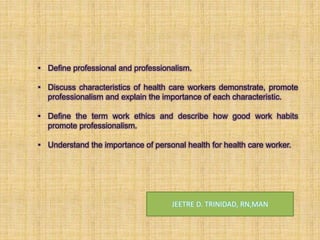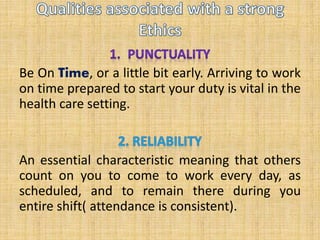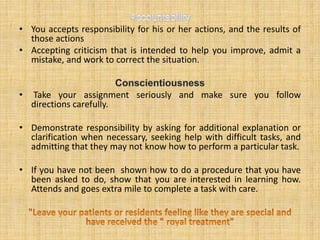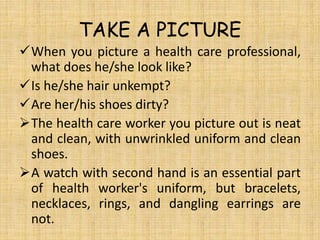PROFESSIONAL AND PROFESSIONALISM
- 2. • Define professional and professionalism. • Discuss characteristics of health care workers demonstrate, promote professionalism and explain the importance of each characteristic. • Define the term work ethics and describe how good work habits promote professionalism. • Understand the importance of personal health for health care worker. JEETRE D. TRINIDAD, RN,MAN
- 3. • credentials, obtained through education and training, that enable them to become licensed or certified to practice a certain profession. • certificate to perform their jobs, and they may not even need a specific educational background. • Being a professional also means having a professional attitude, or exhibiting professionalism.
- 4. • The side of ourselves, display and communicate outwardly how we feel about things. • A person's attitude is apparent from things she/he says • How he/she behaves, and the way he/she looks. Described in many ways and measured by any number of standards, but simply put it and relates specifically to your attitude toward your work.
- 5. Be On Time, or a little bit early. Arriving to work on time prepared to start your duty is vital in the health care setting. An essential characteristic meaning that others count on you to come to work every day, as scheduled, and to remain there during you entire shift( attendance is consistent).
- 6. • You accepts responsibility for his or her actions, and the results of those actions • Accepting criticism that is intended to help you improve, admit a mistake, and work to correct the situation. • Take your assignment seriously and make sure you follow directions carefully. • Demonstrate responsibility by asking for additional explanation or clarification when necessary, seeking help with difficult tasks, and admitting that they may not know how to perform a particular task. • If you have not been shown how to do a procedure that you have been asked to do, show that you are interested in learning how. Attends and goes extra mile to complete a task with care.
- 7. • Always treat others with respect, both your patients or coworkers. • The phrases "Please, thank you, and excuse me" can improve quality of almost any interaction. • Address people as they prefer to be addressed by their first name, preceded by “Sir/Mr, Ma'am/Ms.” • Being polite and having good manners are correct in any situation. considering other feelings and beliefs shows that you truly care about the person. • If the person you are speaking to is a patient or significant others , he or she may begin to question the quality of care that is being given. • You are expected to accurately record vital signs and other information about the condition of people's valuables. • You will be trusted with information of a care and medical condition. If you act in a way that gives your patients or folks reasons to lose confidence in their ability to trust you, it will be very difficult to reestablish your relationship.
- 8. • Making an effort to get along with your coworkers will make your work easier and will ease burden on your coworkers as well. • A good nurse/assistant does not wait for a coworker to ask for help; he or she sees a need and offers a helping hand. • You will undoubtedly have to work with people you may not especially like, but a professional is able to put his or her personal feelings aside or the benefit of the patients. • That you are able to try and imagine what it would feel like to be in another person's situation. • There are times when coworkers, patients or residents, or the family members of patients will really try your patience, but if you think of how you would feel if you were in a similar situation, you may find that you are able to understand the offending behavior better. "Treating people with kindness is a better reflection of professionalism than, for example, displaying superior intellect.”
- 9. Desire to learn • Although you may have completed your trainings as NURSE/Assistant, you will never stop needing to learn new things. The field of health care is constantly changing, and new techniques and treatments are developed daily. • To provide the best possible care to your patients, you must continue to learn new way of caring for them. It is not responsibility of your supervisor or your place of employment to keep you up to date on new health care issues (Technologies/Forms/Updates/News)
- 10. Personal Health To keep your body in good physical condition 1. GET ENOUGH SLEEP 2. EAT WELL-BALANCED MEALS 3. EXERCISE REGULARLY 4. DO NOT SMOKE 5.DO NOT TAKE RECREATIONAL DRUGS AND LIMIT YOUR ALCOHOL INTAKE. 6. HAVE A ROUTINE PHYSICAL EXAMINATION
- 11. MAINTAINING YOUR EMOTIONAL HEALTH 1.Caring for others is an emotionally demanding well as a need to cut costs, many facilities are understaffed, which means that employees are overworked. 2. Not all patients are happy, or grateful for the care they are receiving. Many people in need of care do not feel well and, as a result, may be difficult or hard to manage. Sometimes a person who is ill or worried will become angry or critical and he or she will take these feelings out on you, even though you have done nothing wrong. 3. As a health worker, you will have to face the death of some of your patients This can be difficult, especially in situations where you have had a chance to develop a relationship with the patient and hid or her family.
- 12. Fortunately, there are actions you can take to help keep your emotions in check while you are on the job, and prevent emotional "BURN-OUT": 1. Maintain your physical health. 2. Be sure to schedule time for yourself. 3. Talking professional help to manage work-related stress. 4. When a situation becomes particularly " Heated" at work, take a physical and emotional break. Have someone relieve you and take a walk outside to calm down. 5. Asked to be assigned to different work areas, or to different patients or residents, occasionally.
- 13. TAKE A PICTURE When you picture a health care professional, what does he/she look like? Is he/she hair unkempt? Are her/his shoes dirty? The health care worker you picture out is neat and clean, with unwrinkled uniform and clean shoes. A watch with second hand is an essential part of health worker's uniform, but bracelets, necklaces, rings, and dangling earrings are not.














